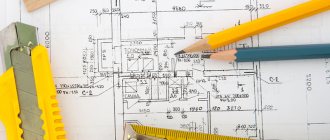What is best to decide on your own in approving the redevelopment of an apartment, and what to delegate
Living in captivity of conventions and stereotypes, a person often goes to extremes. This applies to any questions, incl. — reconstruction of the space of premises and facades. One part of the owners and tenants considers the approval of redevelopment “unaffordable” for independent implementation, while the other considers it to be the lot of professionals. Reality shows that the truth is in the middle. De facto, some issues related to changing the layout can be resolved by yourself. Entrust to specialized ones. We study and analyze procedural nuances in accordance with the content of the material.
Content
- In what cases does nothing need to be agreed upon?
- When can redevelopment be approved by notification?
- Procedure for full approval of apartment redevelopment
- Conclusion
The prevailing opinion that privatized housing can be remodeled at one’s own discretion, without permission, is a dangerous misconception, fraught with extremely unpleasant consequences.
Consequences of unauthorized changes
Not every citizen acts in accordance with the law. Some homeowners transform the premises the way they like, but then problems begin when trying to sell the apartment.
An example is the installation of a shower stall. The housing company should be notified of this, since in the event of a flood, the deception will become known to government agencies.
It is much more economical to carry out approvals as soon as it was decided to redevelop the housing than to then pay fines and legalize changes in court.
In what cases does nothing need to be agreed upon?
In Irkutsk, approval of apartment redevelopment and reconstruction of non-residential areas is coordinated by the Irkutsk Housing Inspectorate. To facilitate the process of approving redevelopment in Irkutsk, a group of works has been formed that does not require a permit. It includes six types of work that do not change the configuration of the premises:
- Cosmetic repairs - replacement of plumbing fixtures, doors, surface finishes of walls, floors, ceilings with analogues with similar characteristics (parameters, properties);
- Dismantling old windows and installing new ones, if the configuration of the openings themselves does not change;
- Glazing of loggias and balconies protruding beyond the perimeter of the building;
- Dismantling built-in mezzanines;
- Installation of suspended and suspended ceilings;
- The installation of air conditioners (monoblocks) in windows, the installation of external units of split systems - in the architectural heritage only on the side facing the courtyard.
Repair, restoration and finishing work that is “cosmetic” in nature is not formally considered a change in the floor plan. For this reason alone, they do not need to coordinate the redevelopment and develop a redevelopment project.
Any work that affects the configuration of premises and leads to a change in footage is regulated by law. Therefore, it is necessary to coordinate the redevelopment of an apartment in Irkutsk. Certain types of the latter are subject to a simplified procedure. It is carried out in order to notify the controlling authority of the fact of the accomplishment. Detailed advice can be obtained on the official website of our company - pereplanirovka-irkutsk.ru.
What is the price
In addition to paying for repair work, the apartment owner will also have to pay for related services.
BTI branches provide a range of necessary operations on a paid basis. Their cost is quite high.
| Types of jobs | Price (rubles) |
| Paperwork | 5 thousand |
| Drafting | from 20 thousand |
| Issuance of a new registration certificate | From 3 thousand |
| Permission from the Housing Administration | Up to 30 thousand |
| Opening layout (1 wall) | From 20 thousand |
| Legalization of unauthorized redevelopment in court | From 30 thousand |
It is worth considering the range of costs for BTI services before starting repairs.
When can redevelopment be approved by notification?
For those interested in the question of how to coordinate the redevelopment of an apartment on their own, we can inform you of the pleasantness. Among the changes in the layout of the internal space of premises and facades of buildings, there are “metamorphoses” that do not affect the load-bearing capacity of structures - supports, walls, ceilings. The implementation of these does not carry the risk of destruction and does not threaten the comfort, safety, health and life of people.
Independent approval of apartment redevelopment through a notification procedure is provided for:
- Dismantling of non-load-bearing partitions, piers, as well as their transfer (installation in another location);
- Dismantling of built-in niches and cabinets that do not form new rooms;
- Closing existing openings in walls and partitions;
- Making new openings in the walls, door openings in the partitions;
- Relocation of plumbing fixtures in existing bathrooms.
To redevelop residential and non-residential areas in the listed cases, permission is not required. The essence of the simplified algorithm for legitimizing alterations comes down to:
- Submission by the owner or his representative (tenant) of an application to make adjustments to the technical documentation;
- Registration within 10 days of an act on the completed reconstruction (redevelopment) of housing and non-residential areas;
- Reconciliation by the authorized representative (inspector) of the changes made with those submitted for registration.
Legitimation procedure
First, you need to clarify that all work does not contradict the legislation of the Russian Federation. If there are no restrictions, the approval process should begin.
First of all
Obtaining a registration certificate for an apartment from the BTI will allow you to familiarize yourself with past redevelopments and draw up a plan for future repair work.
Based on the document, a project of the desired redevelopment is drawn up. Then they collect a package of papers and submit an application along with them for consideration by the Housing Inspectorate. It is permissible to begin changes only after receiving a positive response.
Consultation
Our staff will help you clarify the details:
- Housing Administration.
- Construction Department.
If approval is necessary, you should first go to the BTI for the registration certificate of the apartment, and only after that submit documents and an application to the inspectorate. After approval and completion of the redevelopment work, you will need to contact the BTI again for an amended real estate passport.
Conditions for apartment owners in monolithic buildings
The monolithic building configuration does not contain internal partitions. This feature provides many options for design and interior solutions. The absence of non-load-bearing walls means that the living space is not limited in terms of redevelopment, but this is not entirely true.
Reconstruction of a bathroom or load-bearing wall must be recorded in a new document.
How to legitimize
When renovation work on redevelopment has already been done without approval and drawing up a project, the owner needs:
- Fill out an application to the BTI for the issuance of a technical passport with amendments with unauthorized transformations.
- Order a project from an organization that provides similar services.
- The design documentation is coordinated with the fire inspection, architectural bureau and sanitary and epidemiological station.
- Pay the accrued fine, the amount of which is determined by the Code of Administrative Offenses of Russia.
- Submit an application to the court to recognize the redevelopment as legal.
If all criteria are met, the judge will grant the applicant's request and legalize the completed work.
This year, no major changes have been made to legislation on redevelopment issues. Now, when agreeing on the renovation of an apartment:
- the applicant is allowed to carry out the procedure without submitting a technical passport and a resolution from the architectural protection service;
- If the Unified State Register of Real Estate states the right to carry out alterations of real estate, then documentation confirming these powers will no longer be needed.
Solving the problem of illegal redevelopment is possible not only in court, but also by legalizing the work within the framework of an administrative procedure that is established by local governments. With its help, permitting documents for reconstructive measures are drawn up. However, this possibility is provided only if there are permissions from all services and expert opinions.
Procedure for full approval of apartment redevelopment
When the implementation of the planned reconstruction involves violating the integrity of the load-bearing structural elements of the building's skeleton, a threat arises to the way of life, health and life of the inhabitants. In this case, the “rebuilders” will need not only knowledge of how to coordinate the redevelopment of an apartment, but also the development and approval of the project with the housing inspectorate, BTI, by contacting the multifunctional center.
Subject to approval:
- Combining bathrooms (bathtub, shower, toilet) or increasing their footage due to the corridor;
- Installation of a window in a non-load-bearing wall between the kitchen and the adjacent room;
- Increasing the size of the living room due to the corridor (part of it), adding a balcony or loggia;
- Making doorways in non-load-bearing partitions;
- Relocation of central heating radiators;
- Reconstruction of the floor, etc.
Illegal modification of the layout threatens sanctions ranging from a fine to a decision to return the alterations to their original state.
What redevelopment is not legalized
The Russian Housing Code uses 2 terms that relate to internal modifications of an apartment - redevelopment and reconstruction. The law obliges owners to enter all information about modifications into the technical passport.
Redevelopment is a change in utilities, such as water supply, sewerage, heating and ventilation. This is stated in Art. 25 of the Housing Code.
Changing the configuration inside an apartment is called redevelopment. This concept includes moving partitions between rooms, doorways, reducing or increasing the number of square meters and rooms, as well as the construction of utility rooms. The creation of vestibules in the entrance is also a redevelopment.
Prohibited redevelopment options
This list includes things that definitely cannot be agreed upon.
Expansion of the kitchen at the expense of the living room . Rooms cannot be combined if a gas stove is installed. The partitions should remain, but if you get creative, you can make them sliding or arrange a wide arched opening.
The location of the bathroom is above the living space or kitchen . The ban does not apply to apartments on the ground floor, as well as to those below which there are only non-residential premises.
Installation of heating radiators on a balcony/loggia . The rooms and kitchen are warm, the balcony is cold. Removing the barrier between them violates the integrity of the thermal circuit of the entire building. The ban applies only to the removal of radiators installed in the apartment.
Increasing the area of the bathroom due to the living space or kitchen . The non-residential area of the apartment cannot be increased at the expense of the residential area. Also, you cannot place the bathroom above your neighbors’ kitchen.
Hiding risers for heating, gas and water supply, and sewerage in the walls . This makes them difficult to access in case of emergency.
Installation of a solid fuel fireplace . The ban does not apply to biofireplaces and electric fireplaces. Conventional fireplaces in apartment buildings can only be installed by residents of the top floors.
Any redevelopment affecting crossbars, pylons, columns and other load-bearing elements of the building . Violation of these structures threatens the integrity of the house.
Goals of redevelopment of non-residential premises
Refurbishment of areas that are not intended for living is most often required by entrepreneurs for one or another commercial needs. The main task of the renovation is to achieve maximum optimization of the conditions for using the space, taking into account the specifics of the new functional purpose. Redevelopment of non-residential premises is intended to make it more practical, convenient and aesthetically attractive (if necessary), without violating current building regulations.
Important:
If, according to SNIP, the redevelopment of non-residential premises was carried out with violations or there is no permit for the work at all, then one should, at a minimum, expect penalties, and, at a maximum, forced confiscation by government agencies of housing for sale at auction.
In some cases, it is impossible to change the layout without violating Russian legislation:
- if this leads to non-compliance with fire safety standards;
- in case of risk of deformation or destruction of walls and other structural elements of a load-bearing type;
- with a high probability of deterioration in the appearance and integrity of façade systems;
- when changes pose a potential threat to the life and health of people, including passers-by.







